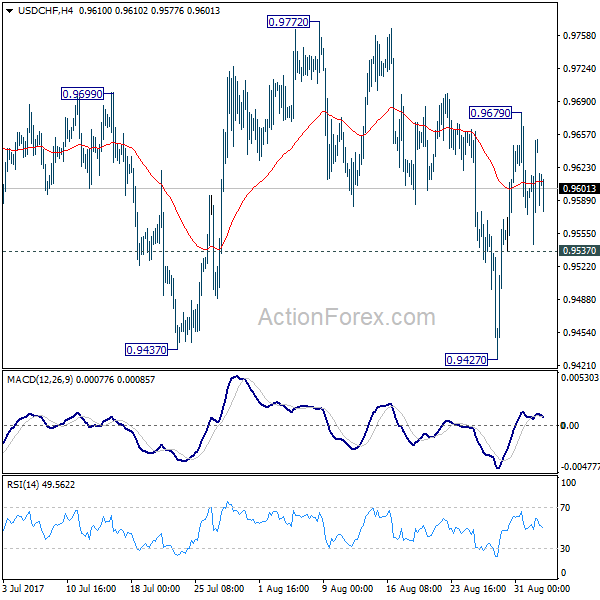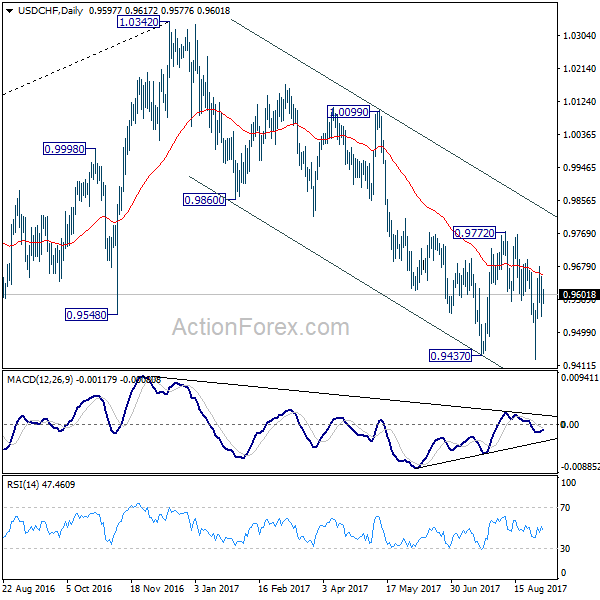The news is huge but the reactions in the markets are relatively mild. Quick escalation in North Korea tension over the weekend triggered selloff in global equity markets. Nikkei suffered much by dropping -0.93% to 19508.25, closing close to intraday low at 19479.40. While European stocks follow, FTSE is back at 7410 after dipping to 7404, down -0.37% at the time of writing. DAX dropped to 10050 but it’s back at 12118, down only -0.20%. CAC, similarly, dips to 5088.28 but is back at 5109, down -0.28%. In the currency markets, no follow through buying is seen in Japanese Yen and Swiss Franc after initial gap up. The more decisive movement is found in gold, which jumps to as high as 1345.5 and is trading above 1340, up fro than 0.75%.
North Korea conducted a sixth nuclear test on Sunday. It’s believed that this one, an advanced hydrogen bomb or a long-range missile, is of a significantly larger scale and more powerful. The detonation of the bomb triggered an initial magnitude 6.3 earthquake in the northern part of North Korea. Nonetheless, both China and Japan said that no radiation is detected after North Korea’s nuclear test. Japan’s government spokesman Yoshihide Suga said today there was "nothing special detected from monitoring posts across the country". China’s Environment Ministry said that "results of monitoring make clear that this North Korean nuclear test as of now has produced no effect on our nation’s environment or the public."
More on North Korea: Acceleration Of Nuclear Test Reinforces Kim’s Brinkmanship Diplomacy
Trump criticized for lashing out his own allies
US President Donald Trump’s main message was condemnation of North Korea’s "hostile and dangerous" and warned of "massive military response". But Trump’s is being criticized for lashing out at allies of US in South Korea and China, which could eventually alienate the US. He said that "South Korea is finding, as I have told them, that their talk of appeasement with North Korea will not work, they only understand one thing!" Trump also hinted at withdrawing from the US-Korea Free Agreement agreements earlier. Its also reported that Trump had two phone calls with Japanese Prime Minister Shinzo Abe, but none with South Korea President Moon Jae-in. Moon was left with his national security director to talk with US national security adviser H.R. McMaster on phone for 30 minutes.
He said that Pyongyang "has become a great threat and embarrassment to China, which is trying to help but with little success." Trump also warned that the US is " is considering, in addition to other options, stopping all trade with any country doing business with North Korea." That clearly refers to China, which continue to be a key economic partner of North Korea despite supporting the economic sanctions. China hit back with Foreign Ministry spokesman Gen Shuang saying that "what is definitely unacceptable to us is that on the one hand we work so hard to peacefully resolve this issue and on the other hand our interests are subject to sanctions and jeopardized" and "this is unfair."
Other options on North Korea tensions
Swiss President Doris Leuthard offers to mediate the standoff between North Korea and US, as well as other countries. Swiss is well know to be a "neutral" and has represented US interests in Iran and Cuba. And, Kim Jong Un once studied in Switzerland too. Leuthard said that "we are ready to also offer our role for good services as a mediator, and in the coming weeks it will all depend on how the U.S. and China can have an influence in this crisis." She added that "perhaps these actions of North Korea are also an invitation for dialogue: We’ll see."
The United Nations Security Council will hold its second emergency meeting in a week regarding North Korea. The Council is expected to bring issue fresh condemnation on North Korea’s provocative acts and discuss other potential steps. Some also called for speeding up of implementation of existing sanctions.
Eurozone investor confidence improved
Eurozone Sentix investor confidence rose to 28.2 in September, up from 27.7 and beat expectation of 27.0. The current conditions sub-index edged down from 40.0 to 39.8. But expectations sub-index rose from 16.0 to 17.3. The Germany tracking index also improved from 33.2 to 34.0. Sentix noted that "low interest rates, increased state spending on refugees and high government subsidies are driving the domestic economy". And, "in addition, Germany is still benefitting from a relatively weak euro." Nonetheless, Sentix also warned that "the data from Germany and the United States last month was disappointing. In both regions, the trend is reversing moderately." Also from Eurozone, PPI rose 0.0% mom, 2.0% yoy in July versus expectation of 0.1% mom, 2.1% yoy.
UK construction PMI dropped to year low
UK PMI construction dropped to 51.1 in August, down from 51.9 and beat expectation of 52.0. That’s also the lowest level in a year. Markit noted that "civil engineering activity was close to stagnation and commercial work dropped at the fastest pace since July 2016. Reports from survey respondents widely suggested that concerns about the UK economic outlook had weighed on the commercial development sector, with clients opting to delay spending decisions and, in some cases, scale back planned projects."
Former BoJ Kiuichi: YCC is fragile and unsustainable
Former BoJ board member Takahide Kiuchi said today that the central bank "has already begun normalizing policy since it shifted to yield curve control (YCC) last year, and that’s the direction the bank seems to heading." He criticized that "YCC is a very fragile framework that won’t be sustainable once the economy is hit with an external shock." And, to rectify, "reviewing YCC and targeting yields for bonds with a shorter duration is one option. It’s quite possible this could happen." Meanwhile, Kiuchi also warned that "there’s not much left monetary policy can do to prop up the economy, and the cost of ultra-easy policy is becoming huge." Kiuchi had been a regular dissenter in BoJ before he left in July.
Elsewhere, Japan monetary base rose 16.3% yoy in August. Australia TD securities inflation rose 0.1% mom in August. Australia company operate profits dropped -4.5% qoq in Q2.
USD/CHF Daily Outlook
Daily Pivots: (S1) 0.9575; (P) 0.9614; (R1) 0.9682; More….
Intraday bias in USD/CHF remains neutral for the moment. Considering it’s close to to 0.9443 key support, consolidation from 0.9427 might extend further. But still, break of 0.9772 resistance is needed to confirm near term reversal. Otherwise, outlook stays bearish for another decline. Below 0.9537 minor support will turn bias back to the downside for retesting 0.9427 first. Break of 0.9427 will resume whole decline from 1.3042.
In the bigger picture, current development suggests that 0.9443 key support (2016 low) could be taken out firmly as down trend form 1.0342 extends. There are various interpretation of the price actions. But in any case, medium term outlook will stay bearish as long as 0.9772 resistance holds. Current down trend could extend to 38.2% retracement of 0.7065 (2011 low) to 1.0342 (2016 high) at 0.9090. However, break of 0.9772 will indicate that USD/CHF has successfully defended 0.9443 again and turn outlook bullish for 1.0099 resistance.


Economic Indicators Update
| GMT | Ccy | Events | Actual | Forecast | Previous | Revised |
|---|---|---|---|---|---|---|
| 23:50 | JPY | Monetary Base Y/Y Aug | 16.30% | 15.60% | 15.60% | |
| 1:00 | AUD | TD Securities Inflation M/M Aug | 0.10% | 0.10% | ||
| 1:30 | AUD | Company Operating Profit Q/Q Q2 | -4.50% | -4.00% | 6.00% | |
| 8:30 | EUR | Eurozone Sentix Investor Confidence Sep | 28.2 | 27 | 27.7 | |
| 8:30 | GBP | Construction PMI Aug | 51.1 | 52 | 51.9 | |
| 9:00 | EUR | Eurozone PPI M/M Jul | 0.00% | 0.10% | -0.10% | -0.20% |
| 9:00 | EUR | Eurozone PPI Y/Y Jul | 2.00% | 2.10% | 2.50% | 2.40% |
